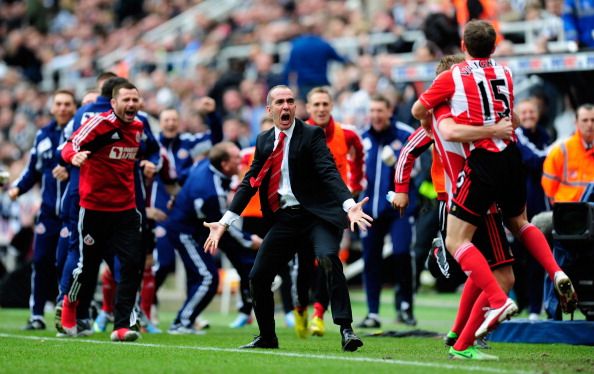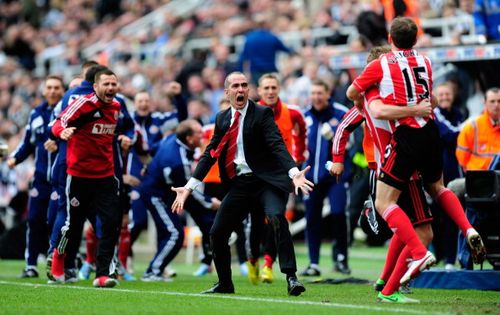
It's vital now for Sunderland to build on the derby win

In Sunderland, they still talk of Gary Rowell’s hat-trick in a 4-1 win at Newcastle in 1978-79 (even though it’s debatable whether he actually got a touch on the first one). Since then, Sunderland had beaten Newcastle only five times, which is why Sunday’s 3-0 victory at St James’ Park has already been written in legend.
Yes, Newcastle were probably tired after Thursday’s Europa League defeat to Benfica. Yes, Newcastle had a perfectly good goal ruled out for offside – although Sunderland also had two good penalty shouts turned down. And, yes, the Sunderland goalkeeper Simon Mignolet made three exceptional saves. But this was still a gloriously unexpected victory built on a performance of unimagined sharpness and intelligence from a team that, a fortnight ago, had seemed locked in an inevitable drift to relegation.
The footballing justification for sacking Martin O’Neill and replacing him with Paolo Di Canio was, largely, to shake things up, to arrest a decline that had come to seem pre-ordained. That it has worked can hardly be questioned – although that does not mean that there are not still grave concerns about his political beliefs, even if there is nothing so likely to make Sunderland fans give a manager the benefit of the doubt than seeing him cavorting down the touchline at St James’ Park.
For Sunderland, there are just two concerns. The first is that a derby win can be an emotionally draining experience, particularly one achieved when it was so desperately needed. Last time Sunderland won a derby, 2-1 at home in 2008, they lost six of their next seven games, leading to the dismissal of Roy Keane. There can be no thought that the job of avoiding relegation is done; realistically they need six – maybe five – more points, and they can’t afford to lose the home game to Stoke on the third-last day of the season.
But there is also the nature of the goals: all of them superb long-range strikes. When O’Neill arrived, Sunderland took 22 points from their first 10 games, leading to a widespread belief he had turned the club around after the decline in the final weeks under Steve Bruce. A look at the stats, though, revealed almost nothing – pass completion, cross success rate, tackles – had changed, apart from chance conversion. Suddenly, for a period of about two months, a disproportionate number of long-range efforts flew in. In part, that was probably down to confidence, but to a large degree it was down to luck and was unsustainable. There had been no fundamental, underlying change.
It’s too early to say whether Di Canio has changed anything fundamental – even if there has been an improvement in certain stats, it may be temporary – but three goals of that nature raises the possibility of an illusory upturn. The vital thing now for Sunderland is to build on the derby win and not see it as (too much of) an achievement in itself. They still have to make sure they stay up.